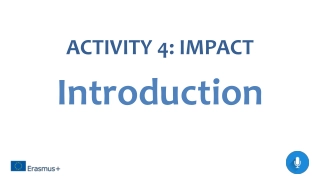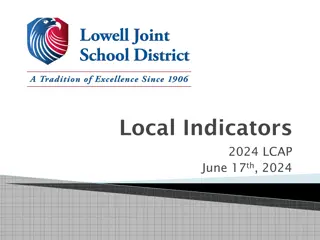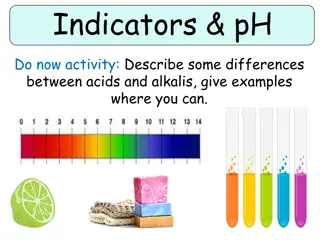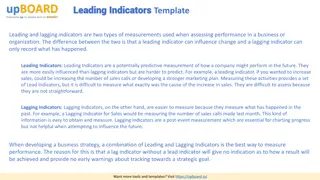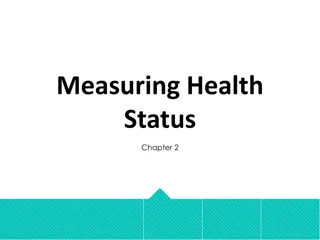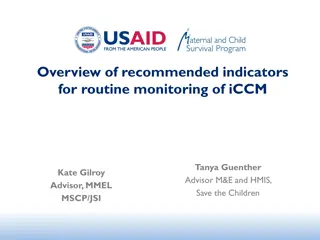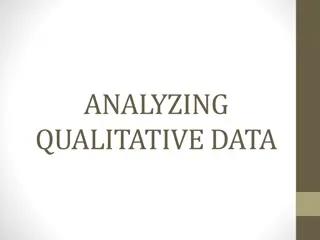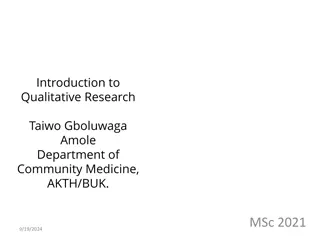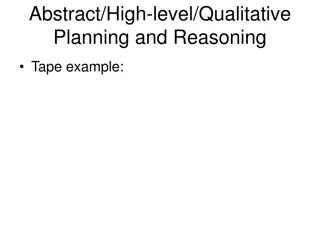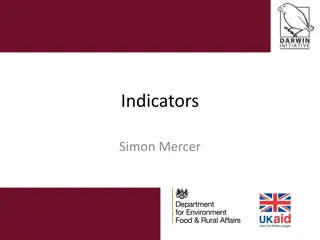Maximizing Impact: Assessing Measures and Evaluating Indicators
Explore the effectiveness of measures within proposals, distinguish between quantitative and qualitative indicators, and deliver informed opinions on adequacy. Evaluate impact potential and validity of measures in fostering the continued use of concepts, products, and services. Enhance understanding
1 views • 24 slides
Understanding Quantitative and Qualitative Research Methods
Exploring the differences between quantitative and qualitative research methods, this content delves into the importance of qualitative research, various methodologies such as focus groups and interviews, data collection, research ethics, and analysis techniques. It also covers the elements of the r
4 views • 43 slides
Understanding Impact Indicators in Monitoring and Evaluation
Impact indicators play a crucial role in monitoring and evaluating activities, projects, or programs. Direct indicators directly measure results, while indirect indicators are used when direct measures are not feasible. Quantitative indicators are expressed numerically, while qualitative indicators
3 views • 4 slides
Pharmacovigilance Indicators for Monitoring Health Interventions in India
The pharmacovigilance indicators outlined by the Indian Pharmacopoeia Commission focus on evaluating the status of pharmacovigilance systems in India. These indicators help measure the effectiveness of health services and interventions, identify strengths and weaknesses, and determine the impact and
2 views • 14 slides
Ensuring Local Indicators Compliance in California's Education System
The document outlines the required local indicators for LCFF priorities in California schools, emphasizing basics like teachers and facilities, academic standards implementation, and parent engagement. It also touches on school climate, course of study, and the criteria for LEAs/charters to be rated
2 views • 7 slides
Understanding Indicators and Standards in Environmental Management
Exploring the concept of indicators and standards in environmental management, this content delves into their definition, selection process, sources, and importance. Indicators are crucial variables used to track changes caused by human activities, aiding in assessing progress towards desired condit
1 views • 27 slides
Understanding Acids and Alkalis: pH Scale and Indicators
Explore the differences between acids and alkalis, learn about indicators, pH scale, and how to categorize solutions as acidic, alkaline, or neutral. Understand the importance of universal indicators in determining acid and alkali strength. Discover the disadvantages of using red and blue litmus pap
3 views • 11 slides
Understanding Qualitative Research: Foundations and Orientations
Explore the foundations of qualitative research and orientations to meaning in Big Q qualitative methods. Delve into the values, characteristics, and theoretical underpinnings of qualitative inquiry, and reflect on the significance of meaning-making in research. Consider the role of subjectivity in
0 views • 23 slides
Understanding the Case Study Method: In-depth Qualitative Analysis
The case study method is a popular form of qualitative analysis involving intensive observation of a social unit. It focuses on detailed analysis of a limited number of events or conditions to understand complex interrelationships. Characteristics include intensive study of a single unit, qualitativ
1 views • 8 slides
Enhancing Natural Experiment Research Through Qualitative Work
Qualitative research plays a crucial role in enhancing natural experiment studies by providing insights into the processes of exposure to interventions, identifying variables influencing exposure likelihood, and determining suitable control groups. Complementary methods within the RE-AIM framework a
0 views • 13 slides
Qualitative Data Analysis Techniques in Research
The purpose of data analysis is to organize, structure, and derive meaning from research data. Qualitative analysis involves insight, creativity, and hard work. Researchers play a crucial role as instruments for data analysis, exploring and reflecting on interview discussions. Steps include transcri
1 views • 27 slides
Using Qualitative Methods in Quality Improvement Projects
Qualitative methods offer valuable insights in quality improvement projects by capturing non-numerical information like experiences, thoughts, and perspectives. They help to understand patient and staff perspectives, challenges, and successes in QI initiatives. Utilizing techniques such as interview
1 views • 21 slides
Understanding Experiential vs. Critical Qualitative Research
Delve into the foundations of qualitative research with a focus on experiential and critical approaches. Explore key concepts, defining characteristics, and theoretical foundations, distinguishing between qualitative and quantitative research. Reflect on different orientations, subjectivity, and ref
0 views • 16 slides
Exploring Key Characteristics of Qualitative Research in Psychology
The lecture series delves into the values, characteristics, and theoretical foundations of qualitative research, emphasizing the differences from quantitative methods. It explores experiential and critical qualitative camps, subjectivity, reflexivity, and ontological and epistemological foundations.
4 views • 18 slides
Ensuring Trustworthiness in Qualitative Research Studies
Trustworthiness in qualitative research is essential for establishing confidence in the study outcomes. Guba's four criteria - credibility, transferability, dependability, and confirmability - provide a framework for achieving trustworthiness. Strategies such as adopting reliable research methods, u
3 views • 10 slides
Understanding NVivo: A Brief Introduction to Qualitative Data Analysis Software
Explore the world of NVivo with Dr. Will Fassbender, an Assistant Professor at Montana State University. Gain insights into qualitative data analysis, download procedures, basic functions, and more. Join this introductory session to discover how NVivo can streamline your research process and aid in
0 views • 16 slides
Understanding Indicators in Strategic Planning and Information Management
Explore the importance of indicators in monitoring and evaluation, learn about different types of indicators such as baseline, output, and outcome. Discover the qualities of a good indicator and the various forms they can take, from direct to qualitative and standardized global indicators versus loc
2 views • 19 slides
Contrasting Qualitative and Quantitative Traits in Genetics
Genetic traits in organisms can be qualitative or quantitative, with qualitative traits controlled by single genes and showing distinct variations, while quantitative traits are influenced by multiple genes and environmental factors, resulting in continuous variations. Qualitative genetics focuses o
0 views • 13 slides
Qualitative Analysis of Aldehydes and Ketones in Chemistry Lab
In this Chemistry 318 lab, students will conduct qualitative analysis of aldehydes and ketones using chemical and spectroscopic methods. The lab includes classification tests, spectroscopy (IR, 1H-NMR/13C-NMR, MS), and identification of unknown compounds. Experimental procedures involve physical eva
1 views • 11 slides
Understanding Quantitative Genetics Principles in Animal Breeding
Quantitative genetics focuses on the inheritance of characteristics based on degree rather than kind, compared to qualitative genetics. It involves polygenes controlling quantitative traits, which exhibit continuous variation and can be measured using metric units. Qualitative traits, on the other h
0 views • 22 slides
Understanding Leading and Lagging Indicators in Business
Leading and lagging indicators play crucial roles in assessing the performance of a business or organization. Leading indicators are predictive, influencing future outcomes, while lagging indicators record past events. A strategic combination of both types is essential for measuring performance effe
1 views • 4 slides
Understanding Health Status Indicators and Measurements
Health status indicators play a crucial role in assessing overall health status at individual, group, and population levels. These measurements, such as self-assessed health status and life expectancy, provide valuable insights for governments to identify trends, enact appropriate interventions, and
2 views • 18 slides
Overview of Recommended Indicators for Routine Monitoring of iCCM
Process to review and refine iCCM indicators for routine monitoring initiated by the M&E sub-group of the global CCM Task Force. The group developed a list of 10 indicators in 6 domains, including Human Resources, Referrals, Service Delivery, Reporting, Supply Chain, and Clinical Coaching. These ind
0 views • 11 slides
Understanding Qualitative Methodology: An Overview
This presentation delves into the realm of qualitative methodology, exploring its purpose, characteristics, approaches, data collection methods, analysis, and learning outcomes. It aims to provide a deep understanding of how qualitative research illuminates voices and experiences, distinguishes betw
0 views • 41 slides
Qualitative Approaches in a Data-Intensive World
Qualitative research involves studying perceptions, experiences, and behaviors through verbal or visual expressions. In a data-intensive world, online communication plays a crucial role in data collection. Qualitative eResearch utilizes Information and Communication Technologies (ICTs) strategically
0 views • 10 slides
Meaning and Meaning-making in Big Q Qualitative Research
Qualitative research explores different understandings of meaning and meaning-making, providing researchers with tools, techniques, and values. Big Q qualitative research focuses on the active role of words in creating meaning beyond reflecting experiences. This lecture series delves into the founda
1 views • 20 slides
Analyzing Qualitative Data: Steps and Coding Methods
Understanding qualitative data analysis involves several key steps, such as preparing the data through transcription, developing codes and categories using content analysis, revising categories based on the data, and reporting the analysis results. Content analysis helps in identifying words, themes
0 views • 32 slides
Design Philosophy for Increasing Accessibility in Qualitative Data Analysis Software
Growing interest in qualitative research methods has led to increased use of Qualitative Data Analysis Software (QDAS). However, challenges remain in making these tools accessible and easy to use, especially in educational settings. This article explores design philosophies to enhance accessibility
0 views • 16 slides
Analyzing U.S. Higher Education Success Metrics: A Qualitative Perspective
Delve into the nuances of U.S. higher education success metrics through a qualitative analysis, exploring the classification of qualitative successes in quantitative datasets and the factors influencing accurate or inaccurate classifications. The study involves individuals who attended community col
0 views • 18 slides
Perceived Risks and Risks Mitigation Practices in Informal Waste Workers: A Qualitative Study
A qualitative study conducted in Kathmandu Valley exploring the perceived risks and mitigation practices of informal waste workers. The research project, led by Sujata Sapkota, aims to address the occupational and health challenges faced by these workers. The study includes a mix of quantitative and
0 views • 22 slides
Strategies for Collective Qualitative Secondary Analysis Using Combined Datasets
Collective qualitative secondary analysis involves reusing data through a collaborative lens, embracing multiple viewpoints to gain deeper insights. The approach emphasizes the constructed nature of research data and allows for diverse interpretations and engagements. This article discusses the proc
0 views • 15 slides
Understanding Research Methods in Public Health
Exploring the nuances of qualitative and quantitative research methods in the context of public health, this content delves into how each approach offers unique insights and perspectives. It discusses the importance of qualitative research in uncovering underlying factors influencing health, interpr
0 views • 77 slides
Qualitative Approach in Cognitive Interview Data Analysis
Understanding the importance of a qualitative approach in analyzing cognitive interview data is crucial for uncovering patterns and recurring themes. This involves delving deeper into the why behind the responses rather than just naming and classifying data. Using methods like standardised coding sc
0 views • 18 slides
Challenges and Opportunities in Science and Technology Policy Indicators
Towards creating indicators for the field of science and technology policy, this content discusses the increasing demands in research management and evaluation, the potential role of indicators in decision-making, the drawbacks of conventional indicators, and the current issues with the usage of sci
0 views • 44 slides
Creative Problem Solving through High-level Qualitative Planning and Reasoning
Explore the world of abstract and high-level qualitative planning through examples like MacGyver's inventive solutions, opening jar tricks, and audience participation in problem-solving. Witness how qualitative reasoning can lead to innovative solutions in various scenarios.
0 views • 15 slides
Understanding Qualitative Data in Counseling
Exploring the challenges and strategies in utilizing qualitative data in counseling, this discussion covers topics such as data collection, coding for meaning, and presenting qualitative evidence. The importance of qualitative data in improving counseling programs and student services is highlighted
0 views • 32 slides
Understanding Indicators in Monitoring and Evaluation
Indicators play a crucial role in monitoring and evaluation by providing signals of progress and success. They measure change, outcomes, and achievements of projects or programs. Different types of indicators exist, such as quantitative, performance, achievement, and accountability indicators. It is
0 views • 12 slides
Understanding Food for Peace Indicators and Evaluation Surveys
This content provides an overview of Food for Peace (FFP) indicators for baseline and final evaluation surveys, with insights on collecting and analyzing data related to key indicators such as household food access, nutrition status, WASH, agriculture, poverty, gender, and family planning. It discus
0 views • 14 slides
Foundations of Qualitative Research: Understanding Methods and Data
Qualitative research involves a mix of different methods drawing on qualitative data, with debates on the need for a sensitive approach for richer appreciation. Understanding qualitative data and context, along with various types of data such as interviews and user-generated content, is essential fo
0 views • 41 slides
Sustainable Development Indicators for Belgium: Progress Towards the SDGs
Belgium's progress on sustainable development indicators towards the Sustainable Development Goals (SDGs) is tracked through a set of global and national indicators. Key updates in the 2024 report include new indicators on child poverty and digital skills, along with revised definitions for capital
0 views • 16 slides
